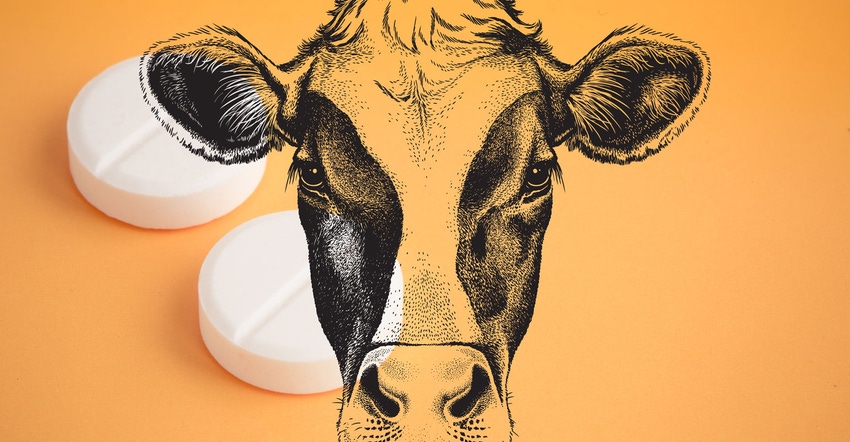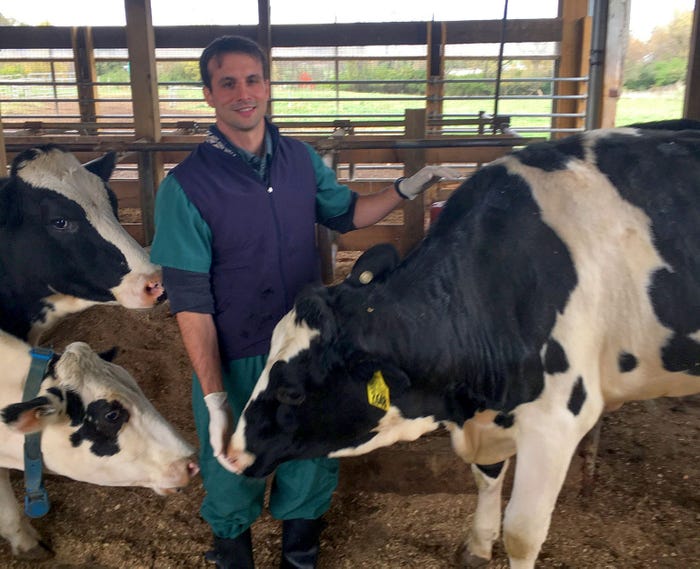September 3, 2020

Dairy cows that received a short course of anti-inflammatory medication after calving had lower metabolic stress and produced more milk than untreated cows, according to researchers who say the regimen they tested could be adopted more easily by producers than previously studied treatment strategies.
"Dairy cows experience systemic inflammation and stress around calving, and these responses increase the risk of diseases, negatively affecting the cows’ health and performance," says lead researcher Adrian Barragan, clinical assistant professor of veterinary and biomedical sciences in Penn State's College of Agricultural Sciences.
An Extension veterinarian, Barragan notes that stress and inflammation related to calving can increase the incidence of diseases such as mastitis, an infection of the udder, and clinical metritis, a bacterial infection of the uterus that can affect up to 40% of postpartum animals.
Previous research suggests that each case of clinical metritis can cost producers about $359, and the total estimated costs of metritis to the dairy industry are $650 million.
"Decreasing this inflammation and stress could be a potential strategy for preventing disease in early lactation, improving the welfare and performance of dairy cows, and reducing disease-related costs for producers," he says.
Earlier research showed that nonsteroidal anti-inflammatory drugs (NSAIDs) can reduce inflammation and increase milk production in postpartum cows. However, these studies involved numerous time-consuming interventions that required extra labor. In addition, treatment length and intervals, ensuring accurate individual drug dosage, and available methods of administration may make these strategies difficult to mesh with modern dairy farm logistics.
 DOING THE RESEARCH: Adrian Barragan, lead researcher, administered the aspirin in cows through boluses, or in pill form, as opposed to previous studies where the drug was pumped into the rumen or injected, or mixed in drinking water, which led to inexact dosing.
DOING THE RESEARCH: Adrian Barragan, lead researcher, administered the aspirin in cows through boluses, or in pill form, as opposed to previous studies where the drug was pumped into the rumen or injected, or mixed in drinking water, which led to inexact dosing.

He says that the research team set out to test a regimen that would be less labor-intensive and less expensive than similar methods used in previous studies.
The researchers, who recently reported their findings in the Journal of Dairy Science, hypothesized that cows treated with the NSAID acetylsalicylic acid — aspirin — after giving birth would have lower incidence of diseases, lower biomarkers of metabolic stress and increased milk yields compared to untreated cows.
On-farm testing
To test this, 246 cows at a family owned dairy in central Pennsylvania were studied, from calving through lactation. The treatment group received two treatments with aspirin, the first within 12 hours after birthing and the second 24 hours later.
The aspirin was administered in boluses, or in pill form, as opposed to previous studies where the drug was pumped into the rumen or injected, or mixed in drinking water, which may lead to inexact dosing. Earlier research also called for shorter intervals between treatments and/or longer courses of treatment.
"We found that cows treated with the proposed anti-inflammatory strategy had lower metabolic stress 14 days after calving and a lower incidence of clinical metritis, compared to untreated cows," Barragan says. "Also, treated cows that had given birth more than once, known as multiparous cows, produced 3.6 more pounds of milk per day during the first 60 days in milk compared to their untreated counterparts."
Although the published study did not include an economic analysis, he pointed out that the estimated value of this increased milk production for an average Pennsylvania dairy herd of 80 cows — taking into account current milk prices and costs for aspirin treatment and labor — would be about $2,250 annually.
"These results suggest that an easy-to-apply, economical and practical anti-inflammatory strategy after calving may improve the health of dairy cows, enhancing both animal welfare and farm profitability," he says.
The USDA’s National Institute of Food and Agriculture supported this work.
Source: Penn State University, which is solely responsible for the information provided and is wholly owned by the source. Informa Business Media and all its subsidiaries are not responsible for any of the content contained in this information asset.
You May Also Like




